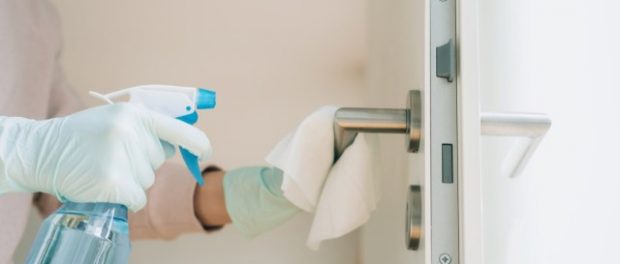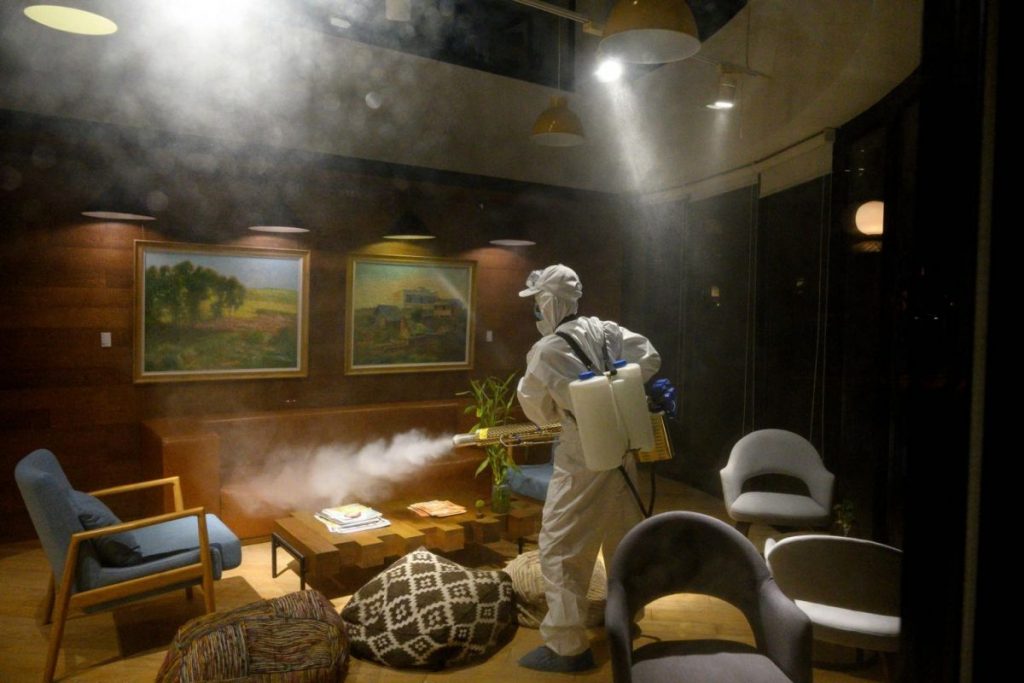What you need to know about cleaning and hygiene during the Coronavirus crisis

When the world is on hygiene lockdown, it’s hardly a surprise that cleanliness has become a hot topic. Analysis of the Twitter feed of one gym chain showed a 3,900% increase in tweets regarding cleanliness and hygiene in the two weeks leading up to the UK lockdown!
Whilst safety on site has always been important, in the current crisis, new risks are coming to the forefront – principally cleanliness and hygiene.
Who you gonna call?
You’ve probably all seen people dressed up in what one of my safety industry friends called “Ghost Busters” outfits, which is showing the industrial side of hygiene, but what exactly are they doing?

Why are some companies doing this and others are “only” vigorously wiping down surfaces?
Unfortunately, there is a lot of misinformation out there on this topic, which is a bit worrying if you think about it! Generalist cleaning companies, who, in my experience, often cannot do rudimentary daily cleaning that well, are offering “decontamination” services; there are specialist contractors who seem to be only doing sanitisation. So, let’s try to give some clarity.
Clean vs sanitised vs disinfected
Firstly, you should know that there is a difference between cleaning, sanitising and disinfection.
Cleaning is the removal of soiling, whether visible of invisible, from a surface.
Sanitising is the reduction of bacteria and germs.
Disinfection is the removal of bacteria and germs.
You can sanitise a surface without necessarily cleaning it first, or indeed you can have one product or process which does both (e.g. your Dettol spray at home). But you cannot disinfect without thoroughly cleaning first.
Even after disinfection, the next time a surface is used it could have germs on it again
It is possible to leave a residual effect on a surface following disinfection which repels any germs, keeping them airborne where they will swiftly die out. However, if that surface gets soiled or has too much abrasion on it, it can become a landing place for bacteria again.
Many disinfection processes do not even leave that residual effect, so as soon as the first person with the virus on their hands touches a door handle, that is contaminated.
Disinfection is not a one-and-done; you need constant maintenance.
So, what should you do, practically, to reduce risk to yourself and others?
If you are running a site or business that is still operational, I’d recommend a weekly deep clean and disinfection clean is done professionally. This can include a residual effect which lasts for up to 8 days (though note as mentioned above that touch points will need regular cleaning and sanitisation between this). On a day-to-day basis, concentrate on sanitising your high frequency touch points such as door handles as much as you can. If people can be wearing gloves, this may help, provided they don’t touch their faces until they’ve taken the gloves off and washed their hands.
If you are travelling to work on public transport, I would have my own spray or pack of wipes with me and I would be cleaning and then disinfecting any surfaces before I touched them. Note that if you have alcohol-based wipes, for example, the alcohol will almost certainly be used up cleaning the surface so then will have nothing left to kill germs – you need a double process.
At home, you shouldn’t need to worry quite as much because germs will be more contained within your family unit. If you need to go out to work, I would strongly advise taking off clothes as soon as you get home, then either washing them or putting them somewhere and leaving them for 72 hours (long enough for any of the virus that may have been deposited onto them to be killed off. Then, give your hands and any exposed skin areas a thorough wash with soap.
And, of course, wash your hands and don’t touch your face!
Interestingly, cases of Norovirus are dramatically down this year because people clearly are washing their hands more than they would have done before. Hopefully we can all stick to this higher level of hygiene when the world returns to normal.
Christian Harris is the founder of Decontamination Cleaning UK (www.decontaminationcleaning.co.uk) and Slip Safety Services (www.slipsafety.co.uk). He supports many insurers, their clients and blue-chip clients of his own, solving and preventing cleanliness and safety issues.
If you need any further advice on this topic, or hands-on assistance with:
- Cleaning
- Sanitising
- Disinfection
- Any slips, trips and falls issues
…feel free to contact him.
